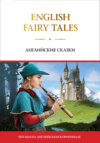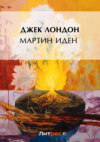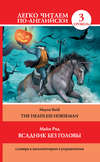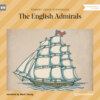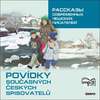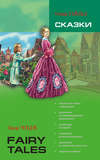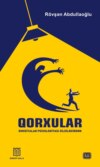Kitabı oku: «English Fairy Tales / Английские сказки», sayfa 2
‘Wuf, wuf,’ said the dog. ‘Sore was the plight of thy wife and thy horses when the giant drove them last night through the forest.’
‘That is why I have come,’ answered the king; and suddenly his heart seemed to fail him and he felt that he could not go on.
‘I cannot fight that giant,’ he cried, looking at the dog with a white face. ‘I am afraid, let me turn homewards.’
‘No, don’t do that,’ replied the dog. ‘Eat and sleep, and I will watch over you.’ So the king ate and lay down, and slept till the sun waked him.
‘It is time for you to start on your way,’ said the dog, ‘and if danger presses, call on me, and I will help you.’
‘Farewell, then,’ answered the king; ‘I will not forget that promise,’ and on he went, and on, and on, till he reached a tall cliff with many sticks lying about.
‘It is almost night,’ he thought; ‘I will make a fire and rest,’ and thus he did, and when the flames blazed up, the hoary hawk of the grey rock flew on to a bough above him.
‘Sore was the plight of thy wife and thy horses when they passed here with the giant,’ said the hawk.
‘Never shall I find them,’ answered the king, ‘and nothing shall I get for all my trouble.’
‘Oh, take heart,’ replied the hawk; ‘things are never so bad but what they might be worse. Eat and sleep and I will watch thee,’ and the king did as he was bidden by the hawk, and by the morning he felt brave again.
‘Farewell,’ said the bird, ‘and if danger presses call to me, and I will help you.’
On he walked, and on and on, till as dusk was falling he came to a great river, and on the bank there were sticks lying about.
‘I will make myself a fire,’ he thought, and thus he did, and by and bye a smooth brown head peered at him from the water, and a long body followed it.
‘Sore was the plight of thy wife and thy horses when they passed the river last night,’ said the otter.
‘I have sought them and not found them,’ answered the king, ‘and nought shall I get for my trouble.’
‘Be not so downcast,’ replied the otter; ‘before noon to-morrow thou shalt behold thy wife. But eat and sleep and I will watch over thee.’ So the king did as the otter bid him, and when the sun rose he woke and saw the otter lying on the bank.
‘Farewell,’ cried the otter as he jumped into the water, ‘and if danger presses, call to me and I will help you.’
For many hours the king walked, and at length he reached a high rock, which was rent into two by a great earthquake. Throwing himself on the ground he looked over the side, and right at the very bottom he saw his wife and his horses. His heart gave a great bound, and all his fears left him, but he was forced to be patient, for the sides of the rock were smooth, and not even a goat could find foothold. So he got up again, and made his way round through the wood, pushing by trees, scrambling over rocks, wading through streams, till at last he was on flat ground again, close to the mouth of the cavern.
His wife gave a shriek of joy when he came in, and then burst into tears, for she was tired and very frightened. But her husband did not understand why she wept, and he was tired and bruised from his climb, and a little cross too.
‘You give me but a sorry welcome,’ grumbled he, ‘when I have half-killed myself to get to you.’
‘Do not heed him,’ said the horses to the weeping woman; ‘put him in front of us, where he will be safe, and give him food, for he is weary.’ And she did as the horses told her, and he ate and rested, till by and bye a long shadow fell over them, and their hearts beat with fear, for they knew that the giant was coming.
‘I smell a stranger,’ cried the giant, as he entered; but it was dark inside the chasm, and he did not see the king, who was crouching down between the feet of the horses.
‘A stranger, my lord! no stranger ever comes here, not even the sun!’ and the king’s wife laughed gaily as she went up to the giant and stroked the huge hand which hung down by his side.
‘Well, I perceive nothing, certainly,’ answered he, ‘but it is very odd. However, it is time that the horses were fed;’ and he lifted down an armful of hay from a shelf of rock and held out a handful to each animal, who moved forward to meet him, leaving the king behind. As soon as the giant’s hands were near their mouths they each made a snap, and began to bit them, so that his groans and shrieks might have been heard a mile off. Then they wheeled round and kicked him till they could kick no more. At length the giant crawled away, and lay quivering in a corner, and the queen went up to him.
‘Poor thing! poor thing!’ she said, ‘they seem to have gone mad; it was awful to behold.’
‘If I had had my soul in my body they would certainly have killed me,’ groaned the giant.
‘It was lucky indeed,’ answered the queen; ‘but tell me, where is thy soul, that I may take care of it?’
‘Up there, in the Bonnach stone,’ answered the giant, pointing to a stone which was balanced loosely on an edge of rock. ‘But now leave me, that I may sleep, for I have far to go to-morrow.’
Soon snores were heard from the corner where the giant lay, and then the queen lay down too, and the horses, and the king was hidden between them, so that none could see him.
Before the dawn the giant rose and went out, and immediately the queen ran up to the Bonnach stone, and tugged and pushed at it till it was quite steady on its ledge, and could not fall over. And so it was in the evening when the giant came home; and when they saw his shadow, the king crept down in front of the horses.
‘Why, what have you done to the Bonnach stone?’ asked the giant.
‘I feared lest it should fall over, and be broken, with your soul in it,’ said the queen, ‘so I put it further back on the ledge.’
‘It is not there that my soul is,’ answered he, ‘it is on the threshold. But it is time the horses were fed;’ and he fetched the hay, and gave it to them, and they bit and kicked him as before, till he lay half dead on the ground.
Next morning he rose and went out, and the queen ran to the threshold of the cave, and washed the stones, and pulled up some moss and little flowers that were hidden in the crannies, and by and bye when dusk had fallen the giant came home.
‘You have been cleaning the threshold,’ said he.
‘And was I not right to do it, seeing that your soul is in it?’ asked the queen.
‘It is not there that my soul is,’ answered the giant. ‘Under the threshold is a stone, and under the stone is a sheep, and in the sheep’s body is a duck, and in the duck is an egg, and in the egg is my soul. But it is late, and I must feed the horses;’ and he brought them the hay, but they only bit and kicked him as before, and if his soul had been within him, they would have killed him outright.
It was still dark when the giant got up and went his way, and then the king and the queen ran forward to take up the threshold, while the horses looked on. But sure enough! just as the giant had said, underneath the threshold was the flagstone, and they pulled and tugged till the stone gave way. Then something jumped out so suddenly, that it nearly knocked them down, and as it fled past, they saw it was a sheep.
‘If the slim yellow dog of the greenwood were only here, he would soon have that sheep,’ cried the king; and as he spoke, the slim yellow dog appeared from the forest, with the sheep in his mouth. With a blow from the king, the sheep fell dead, and they opened its body, only to be blinded by a rush of wings as the duck flew past.
‘If the hoary hawk of the rock were only here, he would soon have that duck,’ cried the king; and as he spoke the hoary hawk was seen hovering above them, with the duck in his mouth. They cut off the duck’s head with a swing of the king’s sword, and took the egg out of its body, but in his triumph the king held it carelessly, and it slipped from his hand, and rolled swiftly down the hill right into the river.
‘If the brown otter of the stream were only here, he would soon have that egg,’ cried the king; and the next minute there was the brown otter, dripping with water, holding the egg in his mouth. But beside the brown otter, a huge shadow came stealing along– the shadow of the giant.
The king stood staring at it, as if he were turned into stone, but the queen snatched the egg from the otter and crushed it between her two hands. And after that the shadow suddenly shrank and was still, and they knew that the giant was dead, because they had found his soul.
Next day they mounted the two horses and rode home again, visiting their friends the brown otter and the hoary hawk and the slim yellow dog by the way.
The Tulip Fairies
Near a pixy field in the neighbourhood of Dartmoor, there lived, on a time, an old woman who possessed a cottage and a very pretty garden, wherein she cultivated a most beautiful bed of tulips. The pixies, it is traditionally averred, so delighted in this spot that they would carry their elfin babes thither, and sing them to rest. Often, at the dead hour of the night, a sweet lullaby was heard, and strains of the most melodious music would float in the air, that seemed to owe their origin to no other musicians than the beautiful tulips themselves, and whilst these delicate flowers waved their heads to the evening breeze, it sometimes seemed as if they were marking time to their own singing. As soon as the elfin babes were lulled asleep by such melodies, the pixies would return to the neighbouring field, and there commence dancing, making those rings on the green which showed, even to mortal eyes, what sort of gambols had occupied them during the night season.
At the first dawn of light the watchful pixies once more sought the tulips, and, though still invisible they could be heard kissing and caressing their babies. The tulips, thus favoured by a race of genii, retained their beauty much longer than any other flowers in the garden, whilst, though contrary to their nature, as the pixies breathed over them, they became as fragrant as roses, and so delighted at all was the old woman who kept the garden that she never suffered a single tulip to be plucked from its stem.
At length, however, she died, and the heir who succeeded her destroyed the enchanted flowers, and converted the spot into a parsley-bed, a circumstance which so disappointed and offended the pixies, that they caused all the parsley to wither away, and, indeed, for many years nothing would grow in the beds of the whole garden. These sprites, however, though eager in resenting an injury, were, like most warm spirits, equally capable of returning a benefit, and if they destroyed the product of the good old woman’s garden when it had fallen into unworthy hands, they tended the bed that wrapped her clay with affectionate solicitude. They were heard lamenting and singing sweet dirges around her grave; nor did they neglect to pay this mournful tribute to her memory every night before the moon was at the full, for then their high solemnity of dancing, singing, and rejoicing took place to hail the queen of the night on completing her circle in the heavens. No human hand ever tended the grave of the poor old woman who had nurtured the tulip bed for the delight of these elfin creatures; but no rank weed was ever seen to grow upon it. The sod was ever green, and the prettiest flowers would spring up without sowing or planting, and so they continued to do until it was supposed the mortal body was reduced to its original dust.
The History of Jack the Giant-Killer
In the reign of the famous King Arthur there lived in Cornwall a lad named Jack, who was a boy of a bold temper, and took delight in hearing or reading of conjurers, giants, and fairies; and used to listen eagerly to the deeds of the knights of King Arthur’s Round Table.
In those days there lived on St. Michael’s Mount, off Cornwall, a huge giant, eighteen feet high and nine feet round; his fierce and savage looks were the terror of all who beheld him.
He dwelt in a gloomy cavern on the top of the mountain, and used to wade over to the mainland in search of prey; when he would throw half a dozen oxen upon his back, and tie three times as many sheep and hogs round his waist, and march back to his own abode.
The giant had done this for many years when Jack resolved to destroy him.
Jack took a horn, a shovel, a pickaxe, his armor, and a dark lantern, and one winter’s evening he went to the mount. There he dug a pit twenty-two feet deep and twenty broad. He covered the top over so as to make it look like solid ground. He then blew his horn so loudly that the giant awoke and came out of his den crying out: “You saucy villain! you shall pay for this I’ll broil you for my breakfast!”
He had just finished, when, taking one step further, he tumbled headlong into the pit, and Jack struck him a blow on the head with his pickaxe which killed him. Jack then returned home to cheer his friends with the news.
Another giant, called Blunderbore, vowed to be revenged on Jack if ever he should have him in his power. This giant kept an enchanted castle in the midst of a lonely wood; and some time after the death of Cormoran Jack was passing through a wood, and being weary, sat down and went to sleep.
The giant, passing by and seeing Jack, carried him to his castle, where he locked him up in a large room, the floor of which was covered with the bodies, skulls and bones of men and women.
Soon after the giant went to fetch his brother who was likewise a giant, to take a meal off his flesh; and Jack saw with terror through the bars of his prison the two giants approaching.
Jack, perceiving in one corner of the room a strong cord, took courage, and making a slip-knot at each end, he threw them over their heads, and tied it to the window-bars; he then pulled till he had choked them. When they were black in the face he slid down the rope and stabbed them to the heart.
Jack next took a great bunch of keys from the pocket of Blunderbore, and went into the castle again. He made a strict search through all the rooms, and in one of them found three ladies tied up by the hair of their heads, and almost starved to death. They told him that their husbands had been killed by the giants, who had then condemned them to be starved to death because they would not eat the flesh of their own dead husbands.
“Ladies,” said Jack, “I have put an end to the monster and his wicked brother; and I give you this castle and all the riches it contains, to make some amends for the dreadful pains you have felt.” He then very politely gave them the keys of the castle, and went further on his journey to Wales.
As Jack had but little money, he went on as fast as possible. At length he came to a handsome house. Jack knocked at the door, when there came forth a Welsh giant. Jack said he was a traveler who had lost his way, on which the giant made him welcome, and let him into a room where there was a good bed to sleep in.
Jack took off his clothes quickly, but though he was weary he could not go to sleep. Soon after this he heard the giant walking backward and forward in the next room, and saying to himself:
“Though here you lodge with me this night, You shall not see the morning light; My club shall dash your brains out quite.”
“Say you so?” thought Jack. “Are these your tricks upon travelers? But I hope to prove as cunning as you are.” Then, getting out of bed, he groped about the room, and at last found a large thick billet of wood. He laid it in his own place in the bed, and then hid himself in a dark corner of the room.
The giant, about midnight, entered the apartment, and with his bludgeon struck many blows on the bed, in the very place where Jack had laid the log; and then he went back to his own room, thinking he had broken all Jack’s bones.
Early in the morning Jack put a bold face upon the matter, and walked into the giant’s room to thank him for his lodging. The giant started when he saw him, and began to stammer out: “Oh! dear me; is it you? Pray how did you sleep last night? Did you hear or see anything in the dead of the night?”
“Nothing to speak of,” said Jack, carelessly; “a rat, I believe, gave me three or four slaps with its tail, and disturbed me a little; but I soon went to sleep again.”
The giant wondered more and more at this; yet he did not answer a word, but went to bring two great bowls of hasty-pudding for their breakfast. Jack wanted to make the giant believe that he could eat as much as himself, so he contrived to button a leathern bag inside his coat, and slip the hasty-pudding into this bag, while he seemed to put it into his mouth.
When breakfast was over he said to the giant: “Now I will show you a fine trick. I can cure all wounds with a touch; I could cut off my head in one minute, and the next put it sound again on my shoulders. You shall see an example.” He then took hold of the knife, ripped up the leathern bag, and all the hasty-pudding tumbled out upon the floor.
“Ods splutter hur nails!” cried the Welsh giant, who was ashamed to be outdone by such a little fellow as Jack, “hur can do that hurself”; so he snatched up the knife, plunged it into his own stomach, and in a moment dropped down dead.
Jack, having hitherto been successful in all his undertakings, resolved not to be idle in future; he therefore furnished himself with a horse, a cap of knowledge, a sword of sharpness, shoes of swiftness, and an invisible coat, the better to perform the wonderful enterprises that lay before him.
He traveled over high hills, and on the third day he came to a large and spacious forest through which his road lay. Scarcely had he entered the forest when he beheld a monstrous giant dragging along by the hair of their heads a handsome knight and his lady. Jack alighted from his horse, and tying him to an oak tree, put on his invisible coat, under which he carried his sword of sharpness.
When he came up to the giant he made several strokes at him, but could not reach his body, but wounded his thighs in several places; and at length, putting both hands to his sword and aiming with all his might, he cut off both his legs. Then Jack, setting his foot upon his neck, plunged his sword into the giant’s body, when the monster gave a groan and expired.
The knight and his lady thanked Jack for their deliverance, and invited him to their house, to receive a proper reward for his services. “No,” said Jack, “I cannot be easy till I find out this monster’s habitation.” So, taking the knight’s directions, he mounted his horse and soon after came in sight of another giant, who was sitting on a block of timber waiting for his brother’s return.
Jack alighted from his horse, and, putting on his invisible coat, approached and aimed a blow at the giant’s head, but, missing his aim, he only cut off his nose. On this the giant seized his club and laid about him most unmercifully.
“Nay,” said Jack, “if this be the case I’d better dispatch you!” so, jumping upon the block, he stabbed him in the back, when he dropped down dead.
Jack then proceeded on his journey, and traveled over hills and dales, till arriving at the foot of a high mountain he knocked at the door of a lonely house, when an old man let him in.
When Jack was seated the hermit thus addressed him: “My son, on the top of this mountain is an enchanted castle, kept by the giant Galligantus and a vile magician. I lament the fate of a duke’s daughter, whom they seized as she was walking in her father’s garden, and brought hither transformed into a deer.”
Jack promised that in the morning, at the risk of his life, he would break the enchantment; and after a sound sleep he rose early, put on his invisible coat, and got ready for the attempt.
When he had climbed to the top of the mountain he saw two fiery griffins, but he passed between them without the least fear of danger, for they could not see him because of his invisible coat. On the castle gate he found a golden trumpet, under which were written these lines:
“Whoever can this trumpet blow Shall cause the giant’s overthrow.”
As soon as Jack had read this he seized the trumpet and blew a shrill blast, which made the gates fly open and the very castle itself tremble.
The giant and the conjurer now knew that their wicked course was at an end, and they stood biting their thumbs and shaking with fear. Jack, with his sword of sharpness, soon killed the giant, and the magician was then carried away by a whirlwind; and every knight and beautiful lady who had been changed into birds and beasts returned to their proper shapes. The castle vanished away like smoke, and the head of the giant Galligantus was then sent to King Arthur.
The knights and ladies rested that night at the old man’s hermitage, and next day they set out for the Court. Jack then went up to the King, and gave his Majesty an account of all his fierce battles.
Jack’s fame had now spread through the whole country, and at the King’s desire the duke gave him his daughter in marriage, to the joy of all his kingdom. After this the King gave him a large estate, on which he and his lady lived the rest of their days in joy and contentment.
